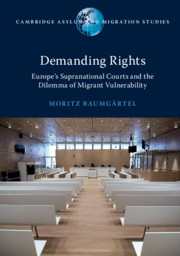Book contents
- Demanding Rights
- Cambridge Asylum and Migration Studies
- Demanding Rights
- Copyright page
- Contents
- Figures
- Tables
- Series Editor’s Preface
- Foreword
- Acknowledgements
- List of Abbreviations
- Part I
- Part II
- 5 From Dilemmatic to Strategic Adjudication
- 6 From Strategic to Consolidating Litigation
- 7 Migrant Rights as Existential Commitments
- 8 Demanding Rights: Some Conclusions
- Appendix
- Bibliography
- Index
7 - Migrant Rights as Existential Commitments
from Part II
Published online by Cambridge University Press: 03 May 2019
- Demanding Rights
- Cambridge Asylum and Migration Studies
- Demanding Rights
- Copyright page
- Contents
- Figures
- Tables
- Series Editor’s Preface
- Foreword
- Acknowledgements
- List of Abbreviations
- Part I
- Part II
- 5 From Dilemmatic to Strategic Adjudication
- 6 From Strategic to Consolidating Litigation
- 7 Migrant Rights as Existential Commitments
- 8 Demanding Rights: Some Conclusions
- Appendix
- Bibliography
- Index
Summary
- Type
- Chapter
- Information
- Demanding RightsEurope's Supranational Courts and the Dilemma of Migrant Vulnerability, pp. 137 - 153Publisher: Cambridge University PressPrint publication year: 2019



